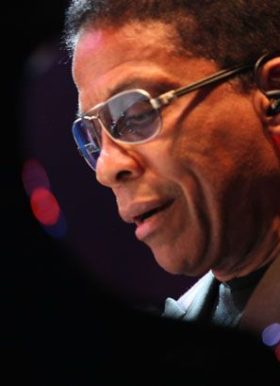
Herbie Hancock
Herbie Hancock is an icon of modern music. Over the last five decades, his distinctive voice and relentless experimentation have made deep, foundational contributions to post-bop and fusion jazz while also shaping contemporary funk, soul, R&B and electronic music and influencing generations of hip-hop and techno artists. Hancock received an honorary doctor of humane letters degree on May 15, 2015.

Born in Chicago in 1940, Mr. Hancock was a child piano prodigy who began studying classical music at age seven and four years later performed with the Chicago Symphony Orchestra.
He formed his first jazz ensemble while at Hyde Park High School, where he also developed a passion for electronics and science. As an undergraduate at Grinnell College in Iowa, he double-majored in music and electrical engineering.
After graduating in 1960, trumpeter Donald Byrd encouraged Mr. Hancock to move to New York, where he spent the next two years recording sessions with Mr. Byrd as well as Phil Woods and Oliver Nelson.
In 1962, Mr. Hancock recorded his solo debut, Takin’ Off, which produced the hit “Watermelon Man.” It also caught the attention of Miles Davis, who in 1963 invited Mr. Hancock to join the Miles Davis Quintet.
Over the next five years, the quintet — which also featured Wayne Shorter (tenor sax), Ron Carter (bass) and Tony Williams (drums) — would record numerous classics, including “E.S.P.,” “Nefertiti” and “Sorcerer.” Today, the line-up is widely considered to have been among the finest in jazz history.
Meanwhile, Mr. Hancock’s solo career continued to blossom through albums such as Empyrean Isles, Maiden Voyage and Speak Like a Child. In 1966, he composed the score to Michelangelo Antonioni’s film “Blow Up,” sparking a long and successful career in film and television music.
Though he continued to record with Mr. Davis through the early 1970s, Mr. Hancock formed his own sextet in 1968 and, in 1971, released Mwandishi, the first in a trio of recordings that experimented with electronic music.
In 1973, Mr. Hancock assembled a new band, The Headhunters, whose eponymous, funk- and soul-inspired debut would become the first jazz album to go platinum.
Genre-bending inspiration
By mid-decade, Mr. Hancock was playing for stadium-sized crowds all over the world. His genre-bending output helped inspire, and provided samples for, the emerging hip-hop and dance music scenes.
At the same time, he continued to record and perform acoustic jazz, notably in duet settings with Chick Corea and Oscar Peterson and with the V.S.O.P. quintet, which reunited most of Mr. Hancock’s former Miles Davis colleagues.
In 1980, Mr. Hancock introduced the trumpeter Wynton Marsalis to the world as a solo artist, producing his debut album and touring with him as well.
In 1983, Future Shock, the first of several collaborations with Bill Laswell, again struck platinum, with the single “Rockit” winning a Grammy for Best R&B Instrumental and becoming a programming staple on the newly launched MTV.
In 1986, Mr. Hancock won an Oscar for scoring the film “Round Midnight,” in which he also appeared as an actor.
In the 1990s, Mr. Hancock released the adventurous Dis Is Da Drum, followed by the Grammy-winning The New Standard and 1+1, an album of duets with Mr. Shorter.
In 1998, Mr. Hancock returned to the studio with The Headhunters and later enlisted Mr. Shorter, Joni Mitchell, Stevie Wonder and others for the Grammy-winning Gershwin’s World. In 2001, Mr. Hancock and Mr. Laswell reunited for the hip-hop and techno-inspired Future 2 Future.
In all, Mr. Hancock has recorded more than 50 solo albums and won 14 Grammy Awards, most recently earning Best Pop Collaboration With Vocals and Best Improvised Jazz Solo for his 2010 The Imagine Project.
In 2008, he won Album of the Year at the Grammy Awards for River: The Joni Letters, a tribute to Ms. Mitchell.
Mr. Hancock serves as the creative chair for jazz for the Los Angeles Philharmonic, institute chairman of the Thelonious Monk Institute of Jazz and co-president of the International Committee of Artists for Peace.
In 2011, Mr. Hancock was designated a UNESCO Goodwill Ambassador and the following year helped create International Jazz Day, which is celebrated worldwide on April 30th.
He was among five recipients of the prestigious Kennedy Center Honors in 2013. His memoir, Herbie Hancock: Possibilities, was published in 2014.
Mr. Hancock, who lives in Los Angeles, California, has been married to his wife, Gigi, for 46 years. They have one daughter, Jessica.